Related Research Articles

A bicycle, also called a pedal cycle, bike, push-bike or cycle, is a human-powered or motor-powered assisted, pedal-driven, single-track vehicle, having two wheels attached to a frame, one behind the other. A bicycle rider is called a cyclist, or bicyclist.

Swansea is a coastal city and the second-largest city of Wales. It forms a principal area, officially known as the City and County of Swansea.

The penny-farthing, also known as a high wheel, high wheeler or ordinary, is an early type of bicycle. It was popular in the 1870s and 1880s, with its large front wheel providing high speeds and comfort.

Moulton is an English bicycle manufacturer based in Bradford-on-Avon, Wiltshire. The company was founded in 1962 by Alex Moulton (1920–2012) who had designed the "Hydrolastic" and rubber cone suspension systems for the BMC Mini motorcar. Moulton bicycles are noted for unconventional frame design, small wheels, and front and rear suspension.

James Starley was an English inventor and father of the bicycle industry. He was one of the most innovative and successful builders of bicycles and tricycles. His inventions include the differential gear and the perfection of the bicycle chain drive.
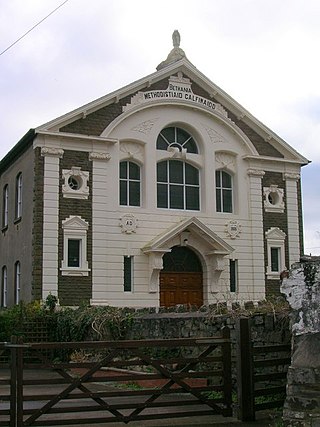
Glanamman is a mining village in the valley of the River Amman in Carmarthenshire, Wales. Glanamman has long been a stronghold of the Welsh language; village life is largely conducted in Welsh. Like the neighbouring village of Garnant it experienced a coal-mining boom in the 19th and early 20th centuries, but the last big colliery closed in 1947 and coal has been extracted fitfully since then.

South Wales is a loosely defined region of Wales bordered by England to the east and mid Wales to the north. Generally considered to include the historic counties of Glamorgan and Monmouthshire, south Wales extends westwards to include Carmarthenshire and Pembrokeshire. In the western extent, from Swansea westwards, local people would probably recognise that they lived in both south Wales and west Wales. The Brecon Beacons National Park covers about a third of south Wales, containing Pen y Fan, the highest British mountain south of Cadair Idris in Snowdonia.
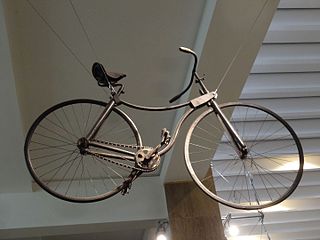
A safety bicycle is a type of bicycle that became very popular beginning in the late 1880s as an alternative to the penny-farthing ("ordinary") and is now the most common type of bicycle. Early bicycles of this style were known as safety bicycles because they were noted for, and marketed as, being safer than the high wheelers they were replacing. Even though modern bicycles use a similar design, the term is rarely used today and is considered obsolete outside circles familiar with high wheelers.
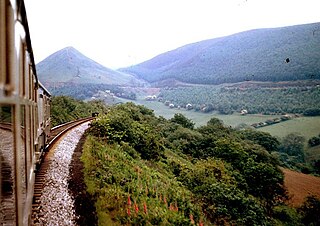
The Heart of Wales line is a railway line running from Craven Arms in Shropshire to Llanelli in southwest Wales. It serves a number of rural centres, including the nineteenth-century spa towns Llandrindod Wells, Llangammarch Wells and Llanwrtyd Wells. At Builth Road, two miles (3.3 km) from the town of Builth Wells, the line crosses the former route of the earlier Mid Wales Railway, which closed in the 1960s.
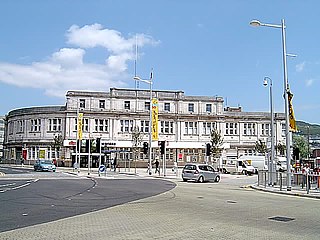
Swansea railway station serves the city of Swansea, Wales. It is 216 miles 7 chains (348 km) measured from London Paddington on the National Rail network.

Transport in Wales is heavily influenced by the country's geography. Wales is predominantly hilly or mountainous, and the main settlements lie on the coasts of north and south Wales, while mid Wales and west Wales are lightly populated. The main transport corridors are east–west routes, many continuing eastwards into England.
Pope Manufacturing Company was founded by Albert Augustus Pope around 1876 in Boston, Massachusetts, US and incorporated in Hartford, Connecticut in 1877. Manufacturing of bicycles began in 1878 in Hartford at the Weed Sewing Machine Company factory. Pope manufactured bicycles, motorcycles, and automobiles. From 1905 to 1913, Pope gradually consolidated manufacturing to the Westfield Mass plant. The main offices remained in Hartford. It ceased automobile production in 1915 and ceased motorcycle production in 1918. The company subsequently underwent a variety of changes in form, name and product lines through the intervening years. To this day, bicycles continue to be sold under the Columbia brand.

Garnant is a mining village in the valley of the River Amman in Carmarthenshire, Wales, north of Swansea. Like the neighbouring village of Glanamman it experienced a coal-mining boom in the 19th and early 20th centuries, but the last big colliery closed in 1936 and coal has been extracted fitfully since then. The village has the only Commissioners' church built in southwest Wales, traditionally a Methodist region.
The Llanelly Railway and Dock Company was an early Welsh railway system. It opened its first short line and a wet dock at Llanelly in 1834, and soon went on to build a longer line from Llanelly to serve pits in the Amman Valley, and then on to Llandilo, reached in 1857. The Llanelly company leased and worked the Vale of Towy Railway on to Llandovery, from 1858.
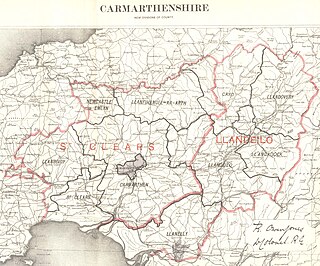
East Carmarthenshire was a county constituency in Carmarthenshire, Wales. It returned one Member of Parliament (MP) to the House of Commons of the Parliament of the United Kingdom, elected by the first past the post voting system.

Bianchi was a brand of Italian motorcycle made from 1897 to 1967 by F.I.V. Edoardo Bianchi S.p.A.. The company also produced automobiles from 1900 to 1939, and today is a major Italian bicycle manufacturer. Edoardo Bianchi started his bicycle manufacturing business in a small shop on Milan's Via Nirone in 1885. Bianchi was a prominent name in the motorcycle racing world from 1925 to 1930.
The Raleigh Bicycle Company is a British bicycle manufacturer based in Nottingham, England and founded by Woodhead and Angois in 1885. Using Raleigh as their brand name, it is one of the oldest bicycle companies in the world. After being acquired by Frank Bowden in December 1888, it became The Raleigh Cycle Company, which was registered as a limited liability company in January 1889. By 1913, it was the largest bicycle manufacturing company in the world. From 1921 to 1935, Raleigh also produced motorcycles and three-wheel cars, leading to the formation of Reliant Motors. Raleigh bicycle is now a division of the Dutch corporation Accell.

Ysgol Dyffryn Aman is a bilingual comprehensive school and VI form. On average, it has about 2000 pupils. It is located on Margaret Street, Ammanford, Carmarthenshire in Wales.
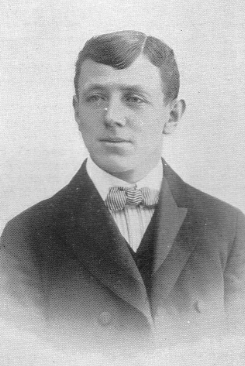
Jimmy Michael was a Welsh world cycling champion and one of the top riders in the sport for several years.

Gustavs Ērenpreis Bicycle Factory was a manufacturer of bicycles and bicycle parts in Riga, Latvia. The factory was founded in 1927 and continued in private operation until 1942. Prior to World War II it grew to become the largest and most important bicycle factory in Baltic States. After the war, the factory was nationalized by the Soviet Union and became the largest bicycle factory in the Latvian SSR as the Red Star Riga Bicycle Factory.
References
- 1 2 3 4 5 6 Lynn Hughes (Winter 2002). "Royal Defiance Cycle Co" (PDF). The Boneshaker. Vol. 17, no. 160. pp. 24–27. Retrieved 2 January 2015.
Masterminded by the talented William Williams, in 1885, they produced a chain-driven bicycle, which on Easter Monday, Arthur rode all the way to Swansea.
- ↑ Amman Valley Chronicle & East Carmarthen News, 23 February 1933 p6.
- ↑ "The Defiance Cycle Ride". Swansea and West Wales CTC (Cyclists’ Touring Club). 2015. Retrieved 2 January 2015.
On Easter Monday in 1885, a momentous event took place in south west Wales. For the very first time, a modern, chain-driven bicycle was ridden all the way from Glanaman in the Amman Valley to Swansea and back.
- ↑ Steve Dube (2002). "First and only cycle company in Wales remembered; HERITAGE: Farming family caused sensation with `bone-shaker' bicycle they built in 1880s". The Free Library. Retrieved 2 January 2015.